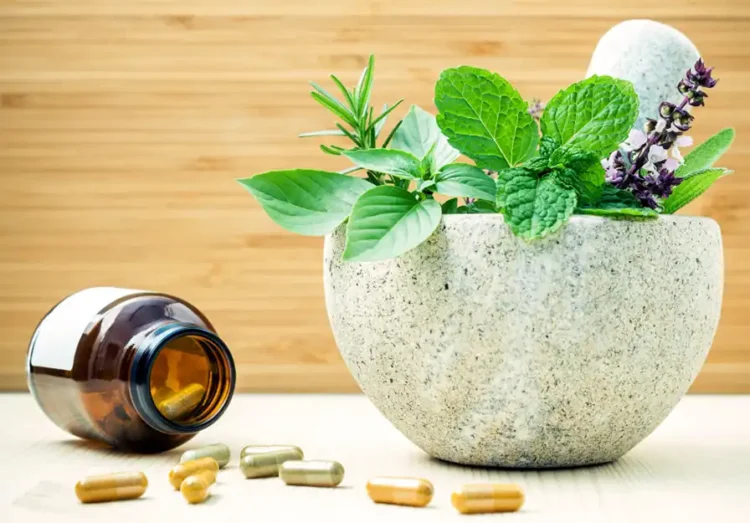Did you know that stress affects approximately 77% of Americans on a regular basis? The fast-paced nature of modern life has led to a significant increase in stress-related issues, including anxiety and insomnia. While there are various treatment options available, many individuals are turning to herbal supplements as natural stress reducers and anxiety remedies.
In this article, we will explore some of the top herbal supplements that have shown potential benefits in relieving stress and anxiety. It’s important to note that while these supplements may offer some relief, more research is needed to fully understand their effectiveness and safety. Always consult with a healthcare professional before incorporating any new supplements into your routine.
Key Takeaways:
- Stress affects approximately 77% of Americans.
- Herbal supplements are popular natural stress reducers.
- Consult with a healthcare professional before starting any new supplements.
- Additional research is needed to fully understand the effectiveness and safety of herbal supplements.
- Managing stress and anxiety requires a multi-faceted approach.
The Potential Benefits of Ashwagandha, L-Theanine, Magnesium, and Vitamin D
In addition to the previously mentioned herbal supplements, there are a few others that have shown potential benefits in relieving anxiety:
Ashwagandha for Anxiety and Insomnia
Ashwagandha is an herb traditionally used in Ayurvedic medicine. It has been studied for its potential effects on anxiety and insomnia. Ashwagandha is thought to help reduce stress and promote relaxation, which may help alleviate symptoms of anxiety. It may also improve sleep quality, making it beneficial for individuals experiencing both anxiety and insomnia.
L-Theanine for Sleep and Anxiety
L-Theanine is an amino acid found in green tea. It has been studied for its calming effects on the mind and body. L-Theanine is thought to promote relaxation, reduce anxiety, and improve sleep quality. By increasing levels of certain neurotransmitters in the brain, L-Theanine may help individuals feel more calm and focused.
Magnesium for Anxiety
Magnesium is an essential mineral that plays a role in many bodily functions, including the regulation of neurotransmitters involved in anxiety. Research suggests that magnesium may have a calming effect on the nervous system and help reduce anxiety symptoms. Adequate magnesium levels may be particularly important for individuals who experience anxiety due to magnesium deficiency.
Vitamin D for Anxiety
Vitamin D, also referred to as the “sunshine vitamin,” is crucial for overall health and has been linked to mood regulation. Some studies suggest that low levels of vitamin D may be associated with an increased risk of anxiety disorders. While more research is needed to fully understand the relationship between vitamin D and anxiety, it is believed that maintaining optimal vitamin D levels may be beneficial for anxiety management.
While these supplements have shown promise in relieving anxiety, it’s important to note that individual results may vary. It’s always recommended to consult with a healthcare professional before starting any new supplement regimen, especially if you have any underlying medical conditions or are taking medications.
| Supplement | Potential Benefits |
|---|---|
| Ashwagandha | Reduces stress and promotes relaxation, improves sleep quality |
| L-Theanine | Calms the mind and body, reduces anxiety, improves sleep quality |
| Magnesium | Calming effect on the nervous system, reduces anxiety symptoms |
| Vitamin D | Potential mood regulation, maintaining optimal levels may be beneficial for anxiety management |
The Role of CBD and Other Supplements in Anxiety Relief
In addition to herbal supplements, there are other supplements that are marketed for anxiety relief. These include:
CBD for Anxiety
CBD, short for cannabidiol, has gained popularity for its potential anxiety-relieving properties. It is derived from the hemp plant and is often available in oil or capsule form. CBD interacts with the body’s endocannabinoid system, which plays a role in regulating mood, stress, and anxiety. Some studies suggest that CBD may help reduce anxiety symptoms and promote a sense of calmness. However, more research is needed to fully understand its effects on different types of anxiety disorders.
Chamomile
Chamomile is a herb that has been used for centuries as a natural remedy for anxiety and insomnia. It is commonly consumed in the form of tea and contains compounds that may help reduce anxiety symptoms. Chamomile is believed to have a mild sedating effect, promoting relaxation and improving sleep quality.
Lavender
Lavender is a fragrant herb known for its calming effects. It has been used as a traditional medicine for anxiety for centuries. Lavender supplements, essential oils, and teas are popular choices for promoting relaxation and reducing anxiety symptoms. Some research suggests that inhaling the scent of lavender may have a positive impact on mood and anxiety levels.
Lemon Balm
Lemon balm, also known as Melissa officinalis, is a herb commonly used in traditional medicine to reduce anxiety and promote relaxation. It is believed to have mild sedative effects and may help calm the mind. Lemon balm can be consumed as tea, taken in supplement form, or used as an essential oil.
Kava Kava
Kava kava is a plant native to the South Pacific and has a long history of use as a traditional medicine to relieve anxiety and promote relaxation. It is believed to work by increasing the levels of gamma-aminobutyric acid (GABA) in the brain, a neurotransmitter that helps regulate anxiety. Kava kava is available in supplement form, although its use has been associated with liver problems in some cases.
Passionflower
Passionflower is a plant commonly used as a natural remedy for anxiety and sleep disorders. It is believed to increase GABA levels in the brain, promoting relaxation and reducing anxiety symptoms. Passionflower supplements, teas, and tinctures are popular options for anxiety relief.
Omega-3 Fatty Acids
Omega-3 fatty acids are essential fats found in fatty fish, such as salmon and mackerel, as well as in flaxseed and chia seeds. These fatty acids have been studied for their potential benefits in reducing anxiety symptoms. Omega-3 supplements are available and may help support overall mental wellness.
While these supplements have shown promise in relieving anxiety symptoms, it’s important to note that they may not work for everyone. The effectiveness of supplements can vary depending on individual factors and the severity of anxiety. It’s recommended to consult with a healthcare professional before starting any new supplements, especially if you have underlying medical conditions or are taking medications. Additionally, it’s important to consider other treatment options for anxiety relief, such as therapy and lifestyle changes, in conjunction with supplement use.
Conclusion
While herbal supplements and other supplements are widely marketed for stress relief and anxiety, it’s crucial to proceed with caution. While some studies have suggested potential benefits, further research is needed to fully understand the effectiveness and safety of these options.
Before starting any new supplements, especially if you have underlying medical conditions or take medications, it’s important to consult with a healthcare professional. They can provide personalized guidance and help you navigate potential risks and interactions.
It’s also important to remember that managing stress and anxiety is a multifaceted process. While supplements may play a role, it’s essential to consider other treatment options such as therapy and lifestyle changes. Each person’s experience is unique, and what works for one individual may not work for another. Finding the right approach may require some trial and error.
In conclusion, while herbal supplements for stress relief and natural stress reducers offer potential benefits, it’s important to approach them as part of a comprehensive treatment plan. Consulting with a healthcare professional and considering various treatment options will help ensure a holistic approach to managing stress and anxiety.











